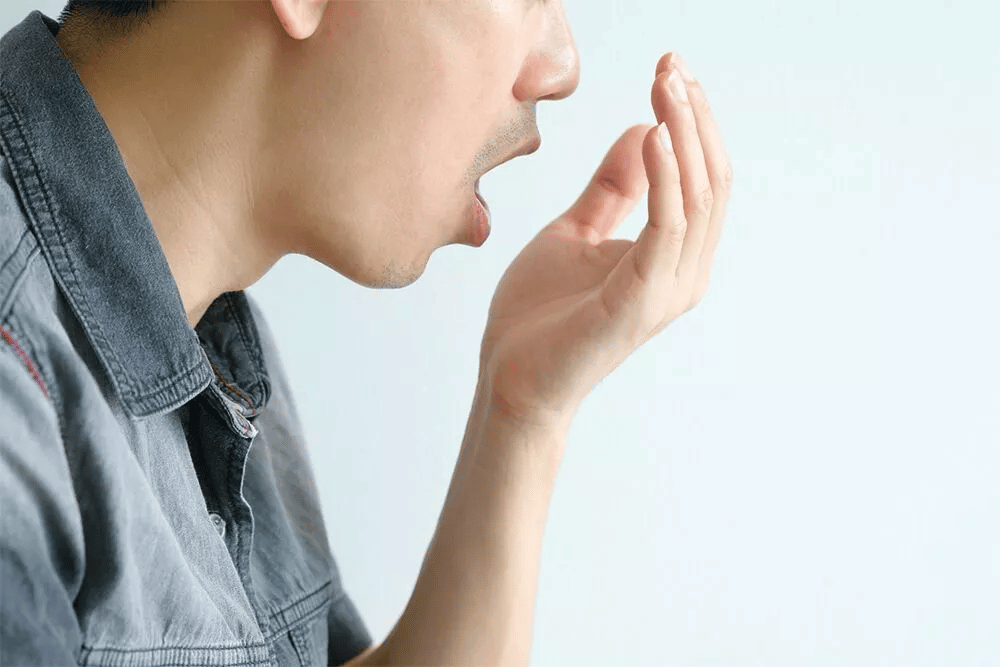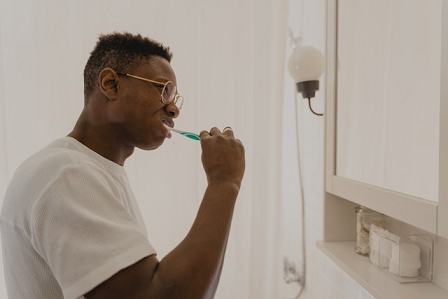How to Fix Bad Breath
It’s time to figure out how to fix that bad breath. Bad breath, also known as halitosis, is a common problem and unfortunately one that can be a bit tricky to get rid of. Other conditions like high blood pressure and GERDs are unnoticeable and can be hidden, but you and everyone else knows when someone suffers from bad breath.
Speaking to others when you have bad breath is embarrassing, and trying to be intimate is nearly impossible. The first step in fixing bad breath is to figure out and understand what’s causing it.
Causes of Bad Breath
There are actually people who see flossing as a chore that should be done at least a few times a month or only when there’s something stuck in their teeth. If this is you, do yourself a favor and really look at what you pull out of your teeth the next time you floss.
Now imagine letting that sit in your mouth for days and weeks at a time. Old food debris turns into bacteria that will stick to your teeth and smell horrible.
One of the most common causes of bad breath is actually the easiest one to fix, not practicing good basic oral hygiene. Brushing at least twice and flossing should be a part of everyone’s daily routine. Frequently cleaning the tongue is also essential as bad bacteria lingering on the tongue can cause foul odors.

Having a dry mouth is also one of the main culprits to having bad breath. The saliva in your mouth acts as a constant cleanser for your mouth. Lack of saliva makes it so left over food and bacteria don’t wash away, leaving your mouth smelling like death. Some medications can cause dry mouth as well as not drinking enough water.
The foods you eat can also play a big role in having bad breath. Obviously, foods with stronger tastes and smells like garlic, onions, and fish tend to linger longer in the mouth as well as are absorbed into the bloodstream. If you’ve ever eaten a heavy garlic meal and then had intense physical activity shortly after, often it seems like your sweat even has a garlic smell to it as well. It is the same concept with your saliva and breath.

Tobacco products will make your mouth stink. Cigarettes, cigars, and chewing tobacco not only cause bad breath but also stain your teeth and can cause conditions like periodontal disease, which itself is another common cause of having bad breath.
Gum disease often causes a bad taste in your mouth as well as an unpleasant odor, even shortly after brushing. It can also lead to even more serious conditions like swollen gums, tooth loss, and even cancer. You should consult with a dentist as soon as you can if you feel you have or are beginning to see symptoms of periodontal disease.
Other underlying medical conditions can also cause bad breath, especially ones that are related to your sinuses, throat, and gut. No amount of brushing will alleviate this as you will need to resolve these underlying issues first in order to improve your breath.
Read More: Do Women Really Like Dad Bods?
How To Fix Bad Breath In 8 Easy Steps

While there are many causes of bad breath, the good news is that it is usually preventable and treatable.
Here are eight tips to help you fix bad breath:
- 1. Practice good oral hygiene. Be sure to brush at least twice a day for at least 2 minutes, floss once a day, and brush your tongue or invest in a tongue scraper. Get regular dental cleanings and checkups.
- 2. Use a toothpaste with fluoride and an antimicrobial agent such as triclosan. Try not to rinse your mouth after brushing. You can spit out the excess toothpaste but don’t rinse with water after. It’s best to let the fluoride soak into your teeth.
- 3. Quit smoking and avoid tobacco products. Smoking is a leading cause of bad breath. It not only dries out your mouth but also leaves behind a residue that can cause bad breath. Smoker’s breath and yellow teeth are not attractive.
- 4. Drink plenty of water and avoid dehydrating beverages such as coffee and alcohol. Caffeinated drinks have a mild diuretic effect, making you urinate more often, dehydrating you more.
- 5. Avoid food that may cause bad breath such as garlic, onion, and spicy foods. If you do eat these foods, be sure to brush your teeth afterwards.
- 6. Chewing sugarless gum and sucking on mints can also help freshen your breath after eating strong-smelling foods. These also stimulate saliva production which helps cleanse the mouth and prevents dry mouth.
- 7. There are also many over-the-counter products that can help with bad breath such as mouthwashes, mints, gums, breath sprays, and lozenges containing zinc or chlorhexidine gluconate. These products can temporarily mask bad breath but they don’t address the underlying cause so they should not be used long-term.
- 8. If you have chronic bad breath, see your dentist or doctor to rule out any underlying medical conditions such as gum disease, GERD, sinus infections, or diabetes. Treating the underlying condition will usually help improve the bad breath.
Also Read: Can You Floss Too Much? The Answer Might Surprise You
Conclusion
There’s no need to suffer from bad breath any longer than you need to. By following these simple tips, you can say goodbye to morning breath, dragon breath, and any other type of bad breath for good. Bad breath is typically not a serious problem and can usually be fixed by practicing good oral hygiene.
It may be inconvenient to spend additional time fussing over your mouth on top of everything else you need to do in a busy day, but just taking 5 minutes out of your day to do a little maintenance on your teeth will help alleviate the bad breath as well as keep your teeth healthy for the rest of your life.




